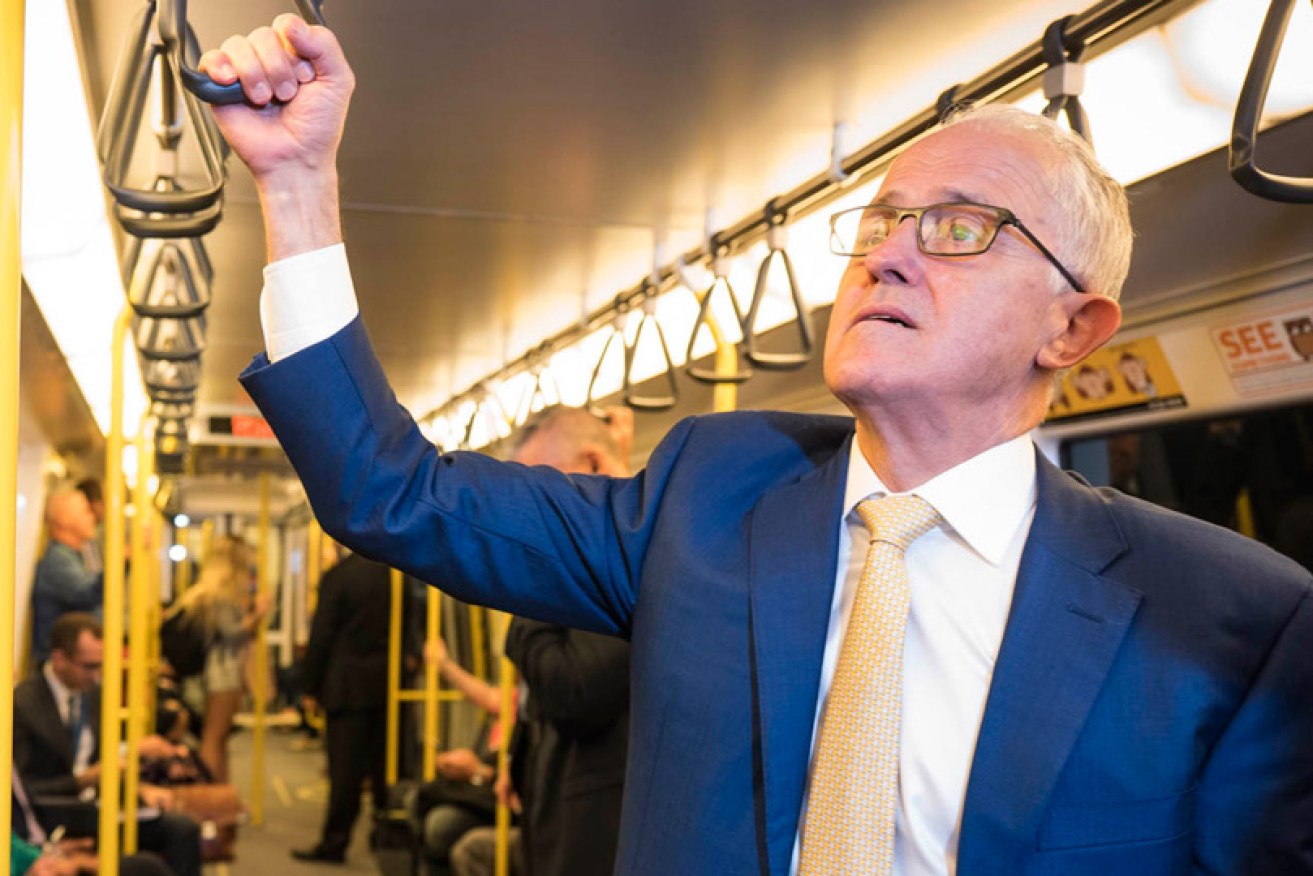An early election is Malcolm Turnbull’s only real option


Now arriving at budget station. Next stop, an early election. Photo: AAP
Pay no attention to those who claim the next federal election is still 12 months away. All the signs point to the election being held in August or September this year.
One of those signs is not this week’s Newspoll, which many claimed had shown a dramatic tightening in the contest between the Turnbull government and the opposition over the past fortnight. In fact, the Newspoll result showed no change at all in the primary vote for the Coalition and Labor, with the ‘tightening’ being due to the flow-on effect of changes in the vote for the Greens and the Australian Conservatives.
Having said that, there has been a modest increase in the Coalition’s primary vote over the past five months from 34 per cent to 38 per cent, but the government would have to lift that vote to 40 per cent to have any chance of winning.
Meantime, Labor’s vote has mostly been at 37 per cent over the same period, but it could win with that proportion thanks to a larger share of preferences flowing from the Greens than the Coalition is likely to get from the smaller conservative parties.
No, it’s not the opinions polls that are pointing to an election sooner rather than later. The main indicators are the electoral timetable and of course the budget in just over a weeks’ time.
If a ‘normal’ election is held, in which all House of Representatives MPs and half the Senate are up for re-election, then polling day must fall between August 4 this year and May 18 in 2019.
It’s impossible to hold an election campaign next year that doesn’t overlap with the NSW election campaign or school holidays. A similar problem occurs from late September this year due to more school holidays and the Victorian election campaign.
Instead of there technically being a 12-month period in which to hold the next election, the practical window is more realistically the two-month period from early August to late September this year (not counting the footy grand final weekend, of course).
So it’s hardly surprising that news emerged this week that PM Malcolm Turnbull had directed the Liberal Party to finalise its candidate selections by June.
If the election does take place this year, it won’t be the Opposition that is left flat-footed. Labor has been in serious campaign mode since the beginning of the year, with Bill Shorten using the non-sitting periods to meet as many voters as he can. Labor has also announced a number of contentious but popular policies.
If anyone is going to be caught unprepared, it will be Tony Abbott and his small band of followers. After failing to bring Mr Turnbull’s Newspoll ratings crashing down over the past fortnight with the coal-lovers bike tour of the Latrobe Valley, the Delcons have repurposed Mr Abbott’s old ‘budget emergency’ mantra to undermine the upcoming federal budget.
Still smarting from the Australian public’s rejection of his 2014 austerity budget, Mr Abbott and his boosters in the media have begun to argue that the true test of economic leadership – that which Mr Turnbull claimed to have when he challenged Mr Abbott – would be to cut budget spending as hard as his predecessor had tried to do.
Of course that’s not going to happen. Governments don’t deliver horror budgets in the same year as an election, and certainly not less than six months before polling day. And as we can tell from the budget titbits that have already been leaked to the media, this year’s offering will be ‘voter-friendly’ and another sure sign the election is not far away.
But that’s not really the point of the ‘debt emergency’ warning by Mr Abbott; it’s more about framing the spending measures in the budget (like tax cuts, and a ‘fully-funded’ NDIS) as frivolous and poor economic management when the nation still has a huge pile of debt.
There have also been suggestions from Abbott supporters that a ‘responsible’ budget with spending cuts would produce an opinion poll boost for the government. That’s codswallop, given the days of budget opinion poll bounces went with the big cash handouts that inspired them. The best the PM can hope for with this budget is that voters don’t hate it and the Coalition’s primary vote doesn’t drop.
Yet in shaping the narrative to create the expectation that a ‘good’ budget should be frugal, the Abbott camp hopes the media and the voters will deem it unsatisfactory. And if this disappointment is reflected in the post-budget opinion polls, Mr Abbott and his cronies will point to this outcome as proof that Mr Turnbull has failed as Liberal leader and prime minister.
That would set the scene for a showdown in the Liberal party room during August, when a weakened PM will try to coax his colleagues into approving the legislation for the National Energy Guarantee. If the Abbott camp has its way and the NEG is rejected, it will be déjà vu (all over again) for Mr Turnbull, leaving the PM yet again hoist on his own climate action petard.
Well at least that’s the plan, but there’s a chance the federal election will have been called by then. No doubt the PM is well aware that calling an ‘early’ election in August or September would rob the Abbott reactionaries of the chance to topple him, leaving him to face the verdict of the Australian people instead.
Paula Matthewson was media adviser to John Howard in the early 1990s and then worked for almost 25 years in communication, political and industry advocacy roles








